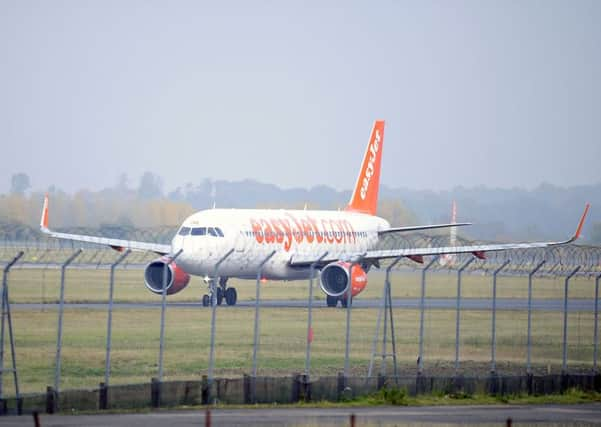EasyJet suffers turbulent first half as losses widen
This article contains affiliate links. We may earn a small commission on items purchased through this article, but that does not affect our editorial judgement.


The low-cost carrier reported a £236 million pre-tax loss in the six months to the end of March, which compares with an £18m deficit in the same period last year.
EasyJet said that the impact of the timing of Easter into the second half of the year stood at around £45m while currency woes cost it £82m in the period.
Advertisement
Hide AdAdvertisement
Hide Ad• READ MORE: EasyJet launches biggest pilot recruitment drive yet
Chief executive Carolyn McCall said: “The first-half loss is in line with market expectations and reflects the movement of Easter into the second half as well as currency effects which together had an estimated impact of circa £127m on the bottom line.”
However, she added that summer bookings are ahead of last year and that demand for flights and holidays remains “strong”, with consumers prioritising travel expenditure over “non-essential” items.
Despite the loss, EasyJet is maintaining its full-year expectations. Revenue grew 3.2 per cent to £1.8 billion in the period, with the group recording a 9 per cent rise in passengers to 33.8 million and a 0.5 per cent increase in load factor to 90.2 per cent.
The airline is also in the midst of setting up a new operating company in mainland Europe and applying for a new licence to secure flying rights on continental routes after Brexit. To this end, EasyJet said it “remains on track” to secure a European air operator certificate by the summer.
McCall added: “Looking ahead, we are seeing an improving revenue per seat trend as well as the continued reduction of competitor capacity growth.
“Cost performance for the full year will continue to be strong, EasyJet is delivering on its strategy of purposeful investment in securing and building strong positions at Europe’s leading airports which is driving competitive advantage with sustainable returns.”
Advertisement
Hide AdAdvertisement
Hide Ad• READ MORE: EasyJet shares tumble after £35m knock to finances
The firm said it had agreed to buy 30 A321 NEO aircraft under its existing agreement with Airbus, with the first arriving in summer 2018. The planes will increase its ability to grow in slot-constrained airports.
Laith Khalaf, senior analyst at financial adviser Hargreaves Lansdown, said: “EasyJet is taking no chances with Brexit, and is in the process of securing an air operator certificate in another EU member state, which will enable it to continue flying passengers on its non-UK routes, though at a cost of £10m.”
He added: “The vote to leave the EU and the associated fall in sterling have not been good for the airline’s share price, which is currently languishing some 20 per cent below where it stood before the referendum.
“EasyJet clearly thinks bigger is more beautiful, as it seeks to further increase capacity in an already crowded marketplace. The strategy is to bolster its position on key routes, allowing it to drive better deals with airports and suppliers.
“Indeed the airline has upgraded an order with Airbus to provide even bigger planes, which will allow EasyJet to fly more people into airports with limited landing slots.”